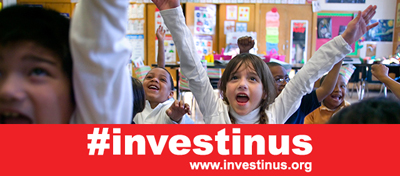On December 10th President Obama hosted a White House Summit on Early Education, bringing together a broad coalition of philanthropic, business, education, child advocacy, and elected leaders and other key stakeholders. It was a welcome chance to celebrate progress in expanding access to quality early childhood development and learning opportunities for children from birth through age 5. Although we haven’t yet seen the passage of needed comprehensive legislation to provide low-income and other at-risk children a full continuum of quality supports from voluntary home visiting programs to Early Head Start and Head Start, child care, pre-kindergarten and — I hope — full-day kindergarten, progress has been made in increasing access to and expanding quality programs and building support for future investments.
The bipartisan budget agreement reached at the beginning of the year placed a priority on new investments in early learning by providing $250 million in new funding for Preschool Development Grants to enhance and expand access to quality preschool programs and $500 million for Early Head Start-Child Care Partnership awards. The President announced at the summit that 18 states will receive Preschool Development Grants and hundreds of communities across 49 states will benefit from Early Head Start-Child Care Partnership awards. He also announced more than $330 million in new philanthropic commitments for early childhood development and learning. This new funding will allow the country to keep moving forward for our young children.
 |
| Learn more about the new initiative |
This isn’t the only good news. In November the President signed into law a bipartisan bill to improve the quality of federally subsidized child care provided by the Child Care and Development Block Grant. The bill sets stronger health and safety standards for subsidized care, makes it easier for parents to find and keep quality child care, and takes steps to improve the quality of child care so that children get quality early childhood development services. A national poll released by the First Five Years Fund earlier this year found 71 percent of voters, including 60 percent of Republicans, support greater federal investments in early childhood education. Bipartisan efforts like this one reflect what many Americans already believe is the right thing to do for children and working parents. Hopefully adequate new funding for these critical improvements will follow. Action must also be taken early in 2015 to continue the Maternal and Infant Early Childhood Home Visiting Program, which over the last six years has invested $1.9 billion in evidence-based programs at this critical front end of the early childhood continuum for infants and young children.
We’re seeing progress at state and local levels too. For example, Alabama increased funding for its state prekindergarten program by $10 million for fiscal year 2015, following a $9.4 million increase for fiscal year 2014. California’s budget included about $264 million in additional funding for early childhood programs, including $70 million for 11,500 new full-day, full-year preschool spaces, $17 million to provide child care assistance to an additional 1,500 children, and $68 million to increase reimbursement rates to child care and early education providers. Michigan increased funding for its Great Start School Readiness program by $65 million for the second year in a row; this year’s increase will allow more than 10,000 additional 4-year-olds to participate. Vermont Governor Peter Shumlin signed a law requiring all school districts to make part-day prekindergarten available to all 3- and 4-year old children.
New York’s budget included a $1.5 billion, five-year investment to expand the state’s prekindergarten program, with the majority of funding allocated to New York City. New York City’s Mayor Bill de Blasio was elected on a platform that included preschool expansion to combat income inequality. As a result of his strong leadership, more than 51,000 New York City children are being served this school year, more than doubling the reach of the city’s preschool system. Seattle voters approved a ballot initiative in November that will pay preschool tuition for up to 2,000 low-income children through a four-year property tax hike. And in December the Indianapolis City-County Council voted to approve a $40 million public-private partnership between the city, business, and philanthropic leaders to give more than 1,000 poor Indianapolis children access to high-quality preschool, a plan championed by Indianapolis Mayor Greg Ballard.
Other Mayors are also stepping up to the plate for our youngest children. At their 2014 annual meeting, the U.S. Conference of Mayors adopted three resolutions affirming their commitment to early childhood development: increased funding for high-quality programs to make them universally accessible, support of the President’s early childhood education agenda, and making a national commitment to building an Early Learning Nation over the next decade.
We need to applaud all of this progress and keep moving forward. Although studies show investments in quality early education can produce a rate of return to society significantly higher than returns on most stock market investments or traditional economic development projects, tens of thousands of children across the country are still waiting for the chance to participate. Our nation can’t afford not to significantly increase investments in early childhood development and learning, or to keep leaving so many poor babies, toddlers, and other young children behind.
Marian Wright Edelman is President of the Children’s Defense Fund whose Leave No Child Behind® mission is to ensure every child a Healthy Start, a Head Start, a Fair Start, a Safe Start and a Moral Start in life and successful passage to adulthood with the help of caring families and communities. For more information go to www.childrensdefense.org.
Mrs. Edelman’s Child Watch Column also appears each week on The Huffington Post.


